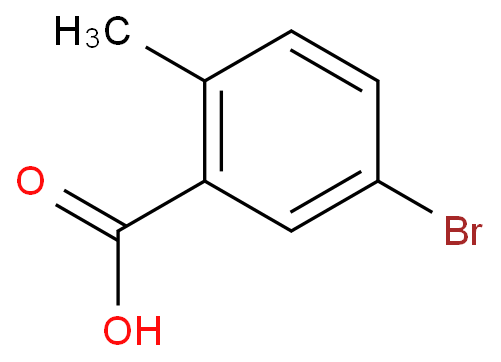 |
[Background and Overview][1][2]
5-Bromo-2-methylbenzoic acid CAS number 79669-49-1, chemical formula C8H7BrO2N, molecular weight 215.04400, Chinese alias: 5-bromo-2-methylbenzoic acid; 5-bromo-2-methylbenzoic acid; melting point 170ºC, boiling point 319.4ºC at 760 mmHg, flash point 147ºC, density 1.599 g/ cm3, refractive index 1.595. 3-Amino-5-bromotrifluorotoluene provides a good intermediate for the development of new anti-cancer drugs. If 5-Bromo-2-methylbenzoic acid is inhaled, move the patient to fresh air; if skin contact occurs, take off contaminated clothing and wash the skin thoroughly with soap and water. If you feel uncomfortable, seek medical attention; if the eyes are clear In case of contact, separate eyelids, rinse with running water or saline, and seek medical attention immediately; if ingested, rinse mouth immediately, do not induce vomiting, and seek medical attention immediately. Advice to protect rescuers is as follows: Move the patient to a safe place, consult a doctor, and if conditions permit, please show this chemical safety data sheet to the doctor who comes to the scene. If there is a small leak, collect the leaked liquid in a sealable container as much as possible, absorb it with sand, activated carbon or other inert materials, and transfer it to a safe place. Do not flush it into the sewer; if there is a large leak, build a dike or dig a pit. Contain, seal the drainage pipe, cover it with foam to inhibit evaporation, use an explosion-proof pump to transfer it to a tanker or a special collector, and recycle or transport it to a waste treatment site for disposal.
[Application]
5-Bromo-2-methylbenzoic acid can be used as an intermediate in the synthesis of canagliflozin, an important 2-(5-bromo-2-methylbenzyl)-5-(4-fluorophenyl)thiophene. Canagliflozin, also known as Canagliflozin, trade name is Invokana, chemical name is (2S,3R,4R,5S,6R)-2-(3-((5-(4-fluorophenyl)) Thiophen-2-yl)methyl)-4-methyl-phenyl)-6-(hydroxymethyl)tetrahydro-2H-pyran-3,4,5-triol, can break down glucose and pass it through the kidneys It is excreted from the body to lower blood sugar levels. Clinical studies have shown that canagliflozin is safe to take, well tolerated, has obvious weight loss effects and good blood sugar control when used alone to treat type II diabetes. 2-(5-Bromo-2-methylbenzyl)-5-(4-fluorophenyl)thiophene, as an important intermediate in the synthesis of canagliflozin, can be directly used as a raw material for the synthesis of canagliflozin and can be prepared into Another important raw material of canagliflozin is 2-(5-iodo-2-methylbenzyl)-5-(4-fluorophenyl)thiophene. Its preparation method includes the following steps:
1) 2-(4-fluorophenyl)thiophene is obtained through a coupling reaction between 2-bromothiophene and p-bromofluorobenzene; the reaction temperature is 10 to 70°C; the solvent is selected from tetrahydrofuran, diethyl ether, isopropyl ether, n-propyl ether, One or more combinations of butyl ether, 2-methyltetrahydrofuran, and toluene; the reaction time is 5 to 24 h, and the catalyst is selected from cobalt acetate, cobalt dichloride, di(acetylacetonate) cobalt, tris(acetylacetonate) Cobalt acetylacetonate, palladium acetate, palladium dichloride, [1,1'-bis(diphenylphosphine)ferrocene]palladium dichloride, tetrakis(triphenylphosphine)palladium, bis(acetylacetone) ) palladium, (1,5-cyclooctadiene) palladium dichloride, nickel acetate, nickel chloride, or a combination of two or more of bis(triphenylphosphorus)nickel chloride. The preferred solvent is tetrahydrofuran. The catalyst is preferably bis(acetylacetonate)palladium.
2) 5-Bromo-2-methylphenyl-2-(4-fluorophenyl)thiophene is obtained through Friedel-Crafts reaction between 2-(4-fluorophenyl)thiophene and 5-Bromo-2-methylbenzoic acid Methone; first prepare 2-methyl-5-bromobenzoyl chloride from 5-Bromo-2-methylbenzoic acid, then mix 2-methyl-5-bromobenzoyl chloride and 2-(4-fluorophenyl)thiophene Friedel-Crafts reaction was performed to obtain the compound 5-bromo-2-methylphenyl-2-(4-fluorophenyl)thiophenone.
3) 2-(5-bromo-2-methylbenzyl)-5-( 4-Fluorophenyl)thiophene. The 5-bromo-2-methylphenyl-2-(4-fluorophenyl)thiophenone is subjected to a reduction reaction to obtain the target compound 2-(5-bromo-2-methylbenzyl)-5-( 4-Fluorophenyl)thiophene.

【Synthesis】
Under N2 atmosphere, add 2-methylbenzoic acid (40.0g, 290mmol) to the mixture of Br2 (160mL) and iron powder (3.20g, 57.0mol) in an ice bath. in suspension. The mixture was warmed to room temperature and stirred for 2 hours. The reaction mixture was poured into water and the reddish solid was collected by filtration. The solid was dried under vacuum at 50°C. The solid was dissolved in 400 mL of methanol, then 640 mL of 0.1 N aqueous HCl solution was added at room temperature. The mixture was stirred to produce a white solid. The solid was recrystallized from ethanol to give 5-Bromo-2-methylbenzoic acid (12.0 g, 19%). 1H NMR (300M Hz, CDCl 3) δ8.17 (d, J = 2.1,1H), 7.56 (dd, J = 8.1,2.1,1H), 7.15 (d, J = 8.1,1H), 2.59 (s, 3H)).

[Main reference materials]
[1] Liu Feng; Pan Xianhua; Zhang Xin; Li Xiaojun; Zhao Dongxian. Preparation method of 2-(5-bromo-2-methylbenzyl)-5-(4-fluorophenyl)thiophene . CN201510287802.X, application date 2015-05-29
[2] HADIDA RUAH, SARA S.; Miller, Mark; Zhou, Jinglan; Bear, Brian; Grootenhuis, Peter Patent: US2009/143381 A1, 2009; Location in patent: Page/Page column 55;
 |